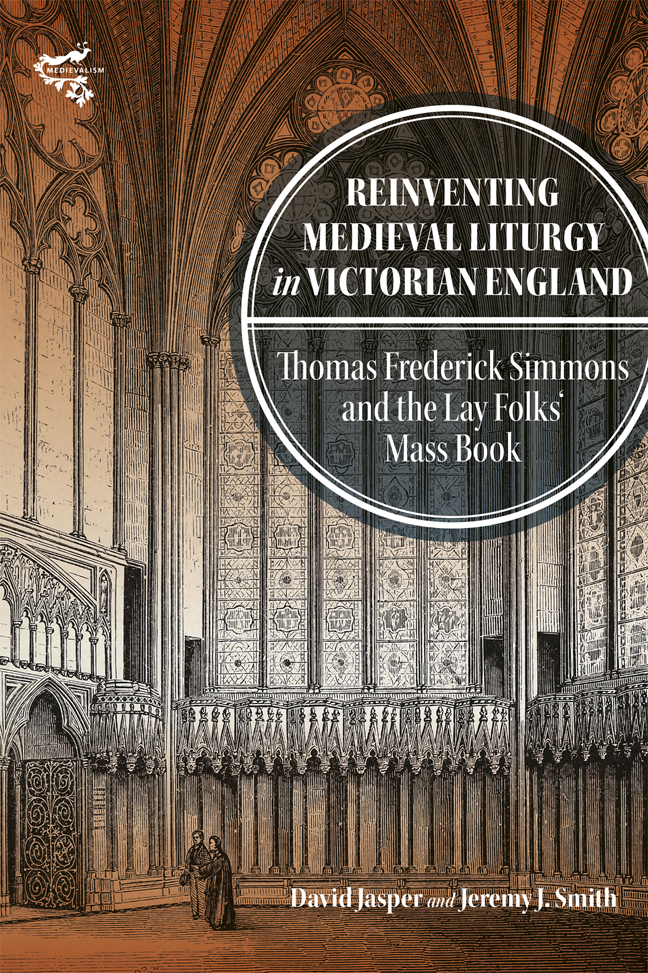 Reinventing Medieval Liturgy in Victorian England
Reinventing Medieval Liturgy in Victorian England Published online by Cambridge University Press: 02 March 2024
Cracking the codes
This book is an exercise in what may be termed recursion: a reconstruction of the cultural and theological significance of Victorian recuperations of medieval liturgical and devotional practice. This task is pursued through a case-study: a Victorian clergyman’s edition – still regarded by scholars as authoritative – of a late Middle English poem, a guide to the liturgy of the Eucharist now known as The Lay Folks’ Mass Book (hence LFMB). The title is the invention of the Victorian clergyman, Thomas Frederick Simmons, who edited it for the Early English Text Society in 1879. This case-study is then used to allow for reflections on the ways in which Victorian and late medieval religious life and practice were connected. In sum, we are trying to re-engage – from a twenty-first century perspective – with a dialogue between medieval past and Victorian present. This dialogue, we believe, demands the distinct perspectives – medievalist and philological, Victorianist and theological – with which our different disciplinary formations have provided us, and which have inspired us to undertake the collaboration of which this book is the outcome.
Why is such an exercise, seemingly convoluted, worthwhile? Despite valiant twentieth- and twenty-first-century attempts at rehabilitation, the Victorian clergyman has from the outset tended to become in popular (and indeed sometimes ‘highbrow’) culture a target for satirical attack or mockery, from Charlotte Brontë and Trollope through Oscar Wilde, Lytton Strachey and beyond. In Shirley (1849), for instance, Brontë wrote of ‘an abundant shower of curates’ raining upon the north of England. These young followers of the Oxford Movement were in her view ‘the present successors of the apostles, disciples of Dr. Pusey and tools of the Propaganda, [who] were at that time being hatched under cradle-blankets, or undergoing regeneration by nursery-baptism in wash-hand-basins’. And, a few years later, Anthony Trollope in Barchester Towers (1857) lampooned evangelical clergy in the figure of the Rev Obadiah Slope. Moreover, as we shall see, with the rise of professional academic practice, especially encouraged in England by contact and sometimes rivalry with the great German-speaking universities at the end of the nineteenth century, it became commonplace to dismiss the scholarly efforts of learned Church of England clerics.
To save this book to your Kindle, first ensure [email protected] is added to your Approved Personal Document E-mail List under your Personal Document Settings on the Manage Your Content and Devices page of your Amazon account. Then enter the ‘name’ part of your Kindle email address below. Find out more about saving to your Kindle.
Note you can select to save to either the @free.kindle.com or @kindle.com variations. ‘@free.kindle.com’ emails are free but can only be saved to your device when it is connected to wi-fi. ‘@kindle.com’ emails can be delivered even when you are not connected to wi-fi, but note that service fees apply.
Find out more about the Kindle Personal Document Service.
To save content items to your account, please confirm that you agree to abide by our usage policies. If this is the first time you use this feature, you will be asked to authorise Cambridge Core to connect with your account. Find out more about saving content to Dropbox.
To save content items to your account, please confirm that you agree to abide by our usage policies. If this is the first time you use this feature, you will be asked to authorise Cambridge Core to connect with your account. Find out more about saving content to Google Drive.